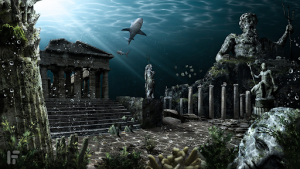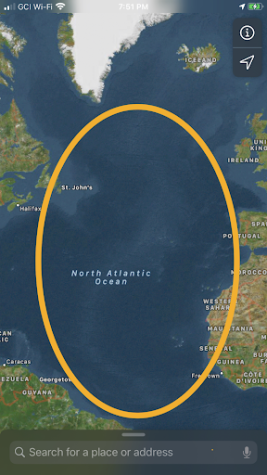Mysteries, Oddities, and Everything Strange: Atlantis
April 21, 2023
Atlantis: The Lost City
Anyone who has ever visited or lived in New York City knows just how massive it is. A city with gigantic skyscrapers, hundreds of square miles worth of urban sprawl, and a melting pot of people, places, and opportunities. Jungles like these are some of the most pivotal parts of American culture and define the country as a whole. But what if New York City were to disappear? Gone in an instant? Reduced to nothing? That might be exactly what happened to the city of legend that vanished under the waves. The lost city of Atlantis has been subject to stories, folklore, and blockbuster Disney movies alike, and today, it’s time to deep dive into the fantastical legend of the city brought to the ocean floor.
 Based on findings and research dating back to its earliest mentions, Atlantis likely never existed. The sheer magnitude of energy and lift that would be required to send a city tumbling into the ocean might extend beyond the realm of modern physics, but practically anything is possible. The story was first told by Greek philosopher Plato almost 2,500 years ago. Plato’s story detailed a near-perfect utopia known as Atlantis, founded by people who were half human and half god. The realm of Atlantis was said to be made of many small islands with a wealth of gold, silver, and advanced technology. Plato did not pinpoint an exact location for Atlantis, and it has led to speculation at where he could have intended it to exist.
Based on findings and research dating back to its earliest mentions, Atlantis likely never existed. The sheer magnitude of energy and lift that would be required to send a city tumbling into the ocean might extend beyond the realm of modern physics, but practically anything is possible. The story was first told by Greek philosopher Plato almost 2,500 years ago. Plato’s story detailed a near-perfect utopia known as Atlantis, founded by people who were half human and half god. The realm of Atlantis was said to be made of many small islands with a wealth of gold, silver, and advanced technology. Plato did not pinpoint an exact location for Atlantis, and it has led to speculation at where he could have intended it to exist.
According to Plato, he had been told the story of the 9,000-year-old civilization that had been passed down for generations through important figures. Despite this, Plato’s accounts of the civilization are the first recorded stories to mention it. The intent of Plato’s story was most likely to discourage the imperialism that Greece was facing. In 360 B.C., Greece was looking to expand on a grand scale, and Plato attempted to dissuade them by creating an idealized version of Athens. According to him, the country was about the same size as North Africa and Turkey combined (which he referred to as “larger than Libya and Asia”) and was situated somewhere in the mid-Atlantic Ocean. He described the civilization as a subcontinent, taking up a large amount of land.
Could Atlantis have existed? Is it possible for a natural phenomenon to pull an entire subcontinent underneath the ocean? History shows that this disaster, although only legend, might actually be plausible. The island of Santorini was home to a large civilization known as the Minoans, but 3,600 years ago, a massive volcano eruption devastated the whole island and completely wiped out all the people living there. The disaster was not the incident that led to Atlantis’ fall, but it might have inspired Plato’s tale. When America was discovered, many heralded it as Atlantis, and some even claimed to have found it in 2018 when they uncovered ponds made to house experimental zooplankton. Many are happy that these projects have drawn interest towards archeology and unearthing secrets such as these, expanding an industry that lacks international attention.
 With advanced technology, oceanography, and ocean mapping have been used to try and locate the city of Atlantis. These tools were unable to locate any forms of land above or underneath the water with the appearance of a lost city. Additionally, the movement of tectonic plates makes the existence of Atlantis impossible because they have spread out rather than contracted over time. Ultimately, there is little to no chance Atlantis or another similar location could have ever existed in the time and location that Plato described. Many, like Ignatius Donnelly, United States Congressman and writer, wholeheartedly believed that Atlantis was simply waiting to be discovered and a treasure trove of artifacts would be unearthed. Donnelly and many others would have been heavily upset as technology progressed and the truth was finally decided.
With advanced technology, oceanography, and ocean mapping have been used to try and locate the city of Atlantis. These tools were unable to locate any forms of land above or underneath the water with the appearance of a lost city. Additionally, the movement of tectonic plates makes the existence of Atlantis impossible because they have spread out rather than contracted over time. Ultimately, there is little to no chance Atlantis or another similar location could have ever existed in the time and location that Plato described. Many, like Ignatius Donnelly, United States Congressman and writer, wholeheartedly believed that Atlantis was simply waiting to be discovered and a treasure trove of artifacts would be unearthed. Donnelly and many others would have been heavily upset as technology progressed and the truth was finally decided.
The most likely answer to the question of Atlantis’ creation was Plato’s imagination. The citizens of Atlantis lived peacefully but were then corrupted by greed and power, leading to a loss of morality and a lack of refinement among the population. Plato claimed that the gods sent punishment to the people of Atlantis to make them pay for their wrongdoing. He loved to detail and investigate the idea of gradual human corruption, and the tale of Atlantis displays exactly that. According to Plato, it was meant to parallel Athens but existed to show the dangers of wealth and military power. Ultimately, although the lost city never dominated the Atlantic Ocean, its message still remains through Plato’s writings, and it can be remembered as an interesting folk tale against imperialism and expansion. A population corrupted by wealth and greed cannot prosper no matter how much gold the city holds.
Resources:
https://www.nationalgeographic.com/history/article/atlantis
https://www.livescience.com/23217-lost-city-of-atlantis.html













































